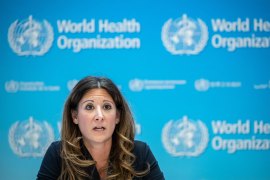Some AIDS Experts Say Insistence on Approval Process for Generics Could Delay Treatment, Require Changes in Drugs
Some AIDS experts have said that the Bush administration's decision to spend money from the President's Emergency Plan for AIDS Relief only on brand-name antiretroviral medications until foreign-made generics have been specially evaluated could delay the rollout of treatment programs or require some programs to begin by dispensing brand-name drugs and later shift to generic equivalents, the Washington Post reports (Brown, Washington Post, 3/28). PEPFAR, which was submitted to Congress last month, details the Bush administration's five-year, $15 billion global AIDS initiative, which seeks to prevent seven million new HIV infections, provide care for 10 million people living with the disease and provide treatment to two million HIV-positive people living in 14 African and Caribbean countries. The plan states that procurement of drugs for the initiative "will have to fit within the parameters of existing federal and international law for the protection of intellectual property rights." Ambassador Randall Tobias, head of the new State Department Office of the Global AIDS Coordinator, has said that the administration is open to the use of generic drugs but has concerns over the safety of the drugs, which have not been approved by FDA (Kaiser Daily HIV/AIDS Report, 3/26). The medications in question are fixed-dose combination antiretroviral drugs, including Cipla's Triomune and Ranbaxy Laboratories' Triviro, which combine stavudine, lamivudine and nevirapine into one pill that is taken twice a day (Washington Post, 3/27). A regimen of the same three drugs purchased separately from patent holders GlaxoSmithKline, Bristol-Myers Squibb and Boehringer-Ingelheim requires six pills a day (McNeil, New York Times, 3/28).
Approval Processes
Triomune and Triviro, which are manufactured by Indian generic drug companies, have been approved through the World Health Organization's "prequalification" system, a voluntary drug screening process through which pharmaceutical companies can submit both brand-name prescription drugs and unpatented generics for evaluation, the Post reports. However, PEPFAR guidelines require drugs to be "approved by a stringent regulatory authority or otherwise demonstrate quality, safety and efficacy at the lowest possible cost." The policy in "practical terms" requires drugs to be approved either by FDA or through a mechanism established by PEPFAR, according to the Post. Although the data collected by WHO for its approval process "may contain all the information PEPFAR needs to reassure itself that [foreign-made] generics are good enough," the data are confidential, PEPFAR Deputy Chief Medical Officer Mark Dybul said, according to the Post. Because WHO cannot provide the data to PEPFAR, U.S. officials are proposing that countries and organizations agree on a set of principles by which fixed-dose combination drugs for HIV/AIDS and other diseases should be judged. Under the plan, each group could "adopt the principles as its own, and drug companies would know what documentation to submit," according to the Post (Washington Post, 3/28). Representatives of FDA, WHO, UNAIDS and other groups at a meeting in Botswana beginning on Monday plan to discuss the proposal (Kaiser Daily HIV/AIDS Report, 3/26).
Implications
Regardless of the meeting's outcome, AIDS experts say that the proposed PEPFAR policy could affect the rollout of antiretroviral drug programs by delaying their start or require some programs to start using brand-name drugs and then switch six months to a year later to generic equivalents. Because drug regimens using brand-name medications require a different number of pills than the combination generic regimens, such a switch could "sow confusion" among people who are taking the drugs and could "complicate the operation" of newly established drug programs, according to the Post (Washington Post, 3/27). "We are very worried that these arguments about the safety of medicines ... will lead to loss of confidence in the products," Ellen 't Hoen of Medecins San Frontieres' Campaign for Access to Essential Medicines said (Borst, AP/Long Island Newsday, 3/29). The issue is especially complicated in countries with programs funded by grants from the Global Fund to Fight AIDS, Tuberculosis and Malaria, which endorses the use of generic drugs (Washington Post, 3/27).
Reaction
"If the administration is successful, desperately needed money will be wasted on overpriced products and fewer dying people will get the treatment they need to live," Sharonann Lynch of Health GAP said (De Capua, VOANews.com, 3/26). Sens. Edward Kennedy (D-Mass.) and John McCain (R-Ariz.) on Friday sent a joint letter to President Bush urging him to accept WHO-approved generics. Dr. Lembit Rago, who leads the WHO assessment program, said that the WHO system uses "absolutely the same principles" in evaluating drugs as FDA but that a "very cold wind began to blow" from the United States after the program approved Triomune and Triviro. "It is no secret that [the pharmaceutical industry] is lobbying against us in a big way," Rago said. A spokesperson for the Pharmaceutical Research and Manufacturers of America said that it was "not involved in any way in this," but he called the Indian generics "new combinations that have not been appropriately treated" (New York Times, 3/27). "If in two or three years we have drug resistance as a result of a therapy that we introduce, we have lost the continent in terms of our ability to treat," Dybul said, adding that if such a situation occurred, the administration would be "crucif[ied] ... for not having the due diligence of looking at the data ourselves -- and rightly so" (Washington Post, 3/27). Rep. Henry Waxman (D-Calif.) in a separate letter alleged that the Bush administration was "trying to set standards for Indian generics higher than those" for U.S.-made generics, the Times reports (New York Times, 3/28).
MPR's "Marketplace Morning Report" on Monday reported on the Botswana conference. The segment includes comments from 't Hoen (Palmer, "Marketplace Morning Report," MPR, 3/29). The complete segment will be available online in RealPlayer after the broadcast.
A webcast of a press briefing discussing the five-year plan for PEPFAR, along with other resources, is available online from kaisernetwork.org.






